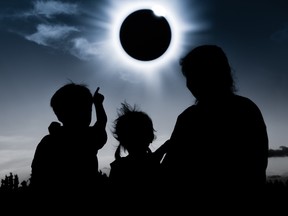
In short, no.

Article content
The damage direct sun exposure can do to the eyes goes by several names, but one of those names – eclipse retinopathy – speaks volumes. It helps explain why there is so much focus on protecting the eyes as Monday’s solar eclipse approaches.
Dr. Michael O’Connor, a pediatric ophthalmologist who heads the department of ophthalmology at CHEO, underscores that there is no safe amount of time to stare directly at the sun, even during a total eclipse. Doing so, even for a matter of seconds, can cause retinal burns or damage to the cells in the retina at the back of the eye and affect the eyesight. That damage can occur with no pain and can be temporary or permanent. It usually doesn’t show up for several hours and presents as blurry vision or loss of central vision.
Advertisement 2
Article content
Article content
“You don’t stare at the sun on a sunny day, and you shouldn’t stare at it on an eclipse day either,” said O’Connor. When it is sunny, people instinctively know not to stare at the sun, because it is hard to do. But during an eclipse, when the vast majority of light rays are blocked, it can feel safe, but it is not, O’Connor said.
“There are still harmful rays that are getting through to your eyes and you don’t want to run the risk of permanent damage by doing that,” he said. “Damage can be done within seconds so there is no safe limit.”
Despite the caution, O’Connor says there is no reason to fear the eclipse.

“It is a big deal for society in general.”
It is something many people will never live through again. A solar eclipse can be experienced safely using protective glasses or lenses or by viewing it through a pinhole device.
But it is important for parents and caregivers to judge whether children are mature enough to fully understand the risks of direct exposure to the sun, he said.
“For older children, this can be explained to them the same way it would for an adult and you can expect them to follow the instructions appropriately for safe solar viewing.”
Advertisement 3
Article content
Younger children are a different story, he said, especially if one adult is trying to supervise multiple children.
“I would encourage folks with young children to avoid viewing the eclipse directly and, instead, to find an alternate means of viewing it.” NASA will broadcast the eclipse online, he said. (You can tune in here: ottawacitizen.com/news/live-eclipse-video-nasa-hosting-real-time-look-at-total-solar-eclipse-on-april-8).
“And you can certainly be indoors not looking directly at the eclipse and experience the darkening of the sky and explain what you are looking at. I think there is a way to get kids excited about this and appreciate the science without having to view the eclipse directly.”
O’Connor said parents and caregivers are the best judges of the maturity of their children. Younger children as well as older children who might have difficulty following the necessary instructions are among those for whom alternate arrangements should be made. He added that if parents are worried their children might take their eclipse glasses off, that is a pretty good indication that they are too young to be watching the eclipse.
Advertisement 4
Article content
A pinhole viewer is another option, he said, for younger children to witness the eclipse without looking at the sun, depending on the ratio of adults or caregivers to children.
Anyone viewing the eclipse outside should have proper eclipse viewing eyewear that has no cracks or worn areas. The American Astronomical Society is among organizations helping people ensure that their eclipse glasses are safe. Visit eclipse.aas.org/eye-safety and aas.org/press/american-astronomical-society-warns-counterfeit-fake-eclipse-glasses for more information.
O’Connor said because it is such a focus of attention, it is important to have good public messaging around eye health and the eclipse.
“It’s not that we expect an epidemic of (eye damage),” he said. “But hopefully, we can make a difference with public messaging.”
Our website is your destination for up-to-the-minute news, so make sure to bookmark our homepage and sign up for our newsletters so we can keep you informed.
Recommended from Editorial
Article content

